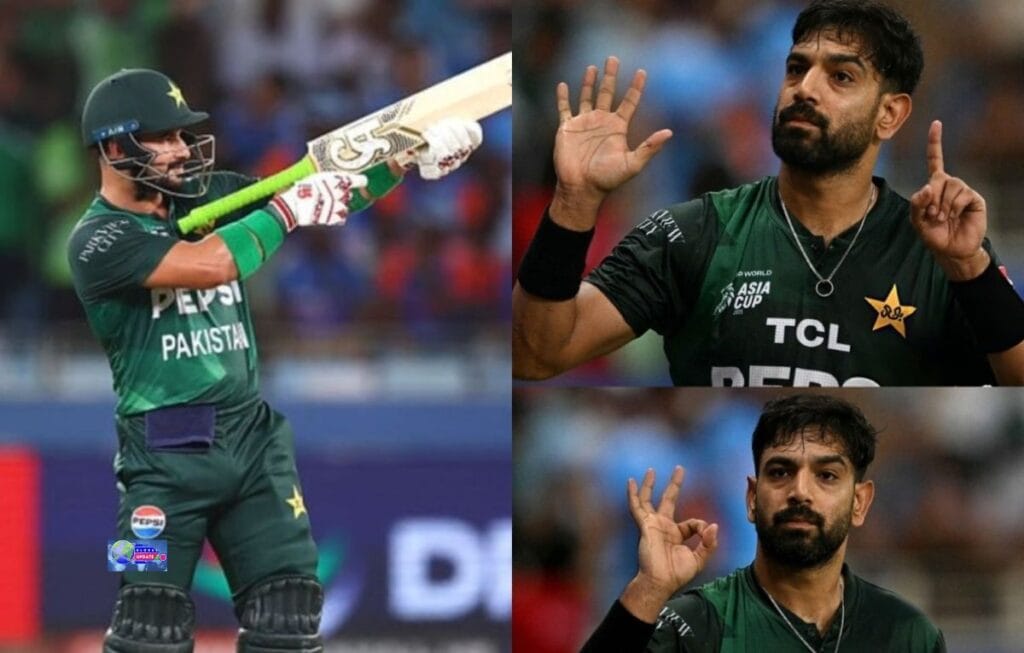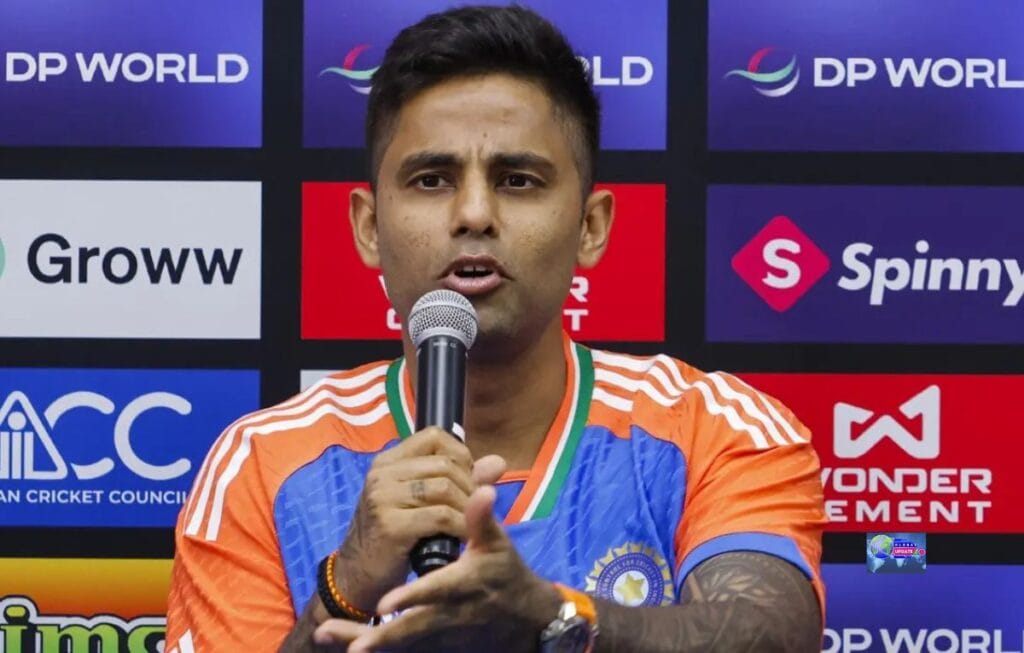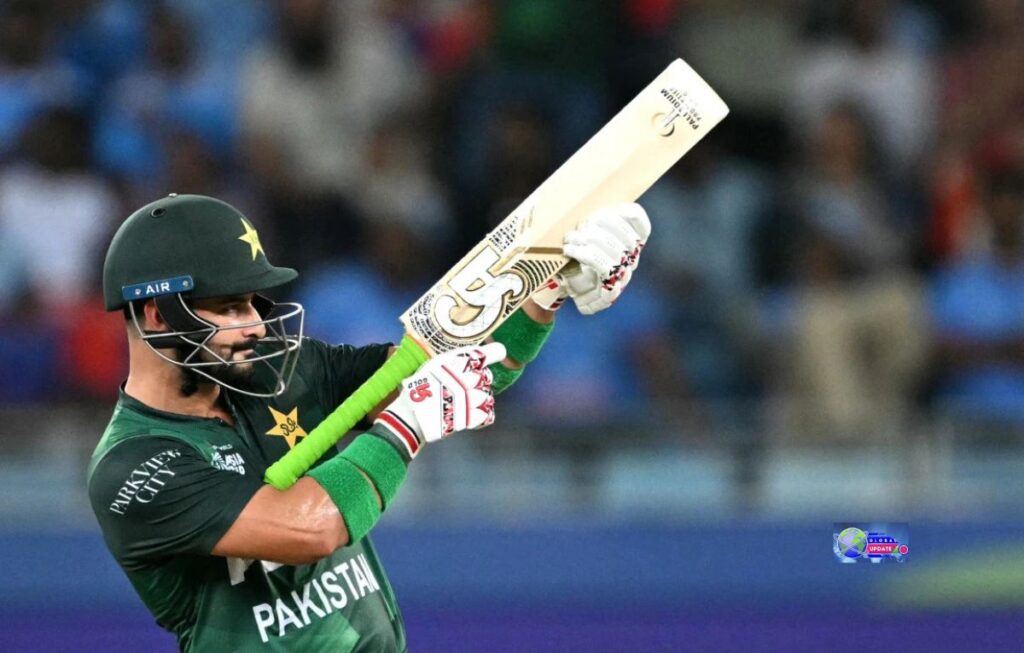Sahibzada Farhan lit up his innings in the Super 4 match vs. India by racing to a half-century in just 34 balls, including three sixes and five boundaries.
Upon reaching fifty, Farhan turned towards his dugout and mimicked a “gun-firing” celebration with his bat.
His gesture immediately sparked controversy on social media, with many fans calling it insensitive, especially given recent political and security tensions.
Sahibzada Farhan: New Controversy & Firepower

- After already drawing criticism for his gun-firing celebration during the Asia Cup 2025, Farhan has reignited controversy by repeating the same gesture in a recent promotional shoot—even after being warned by the ICC.
- He also revealed a “GunMode” bat sticker inspired by that celebration, which has further fuelled debate about his conduct and image.
His 50 in The Asia Cup 2025
- In the Super Four match against India, Farhan scored 58 off 45 balls and celebrated by mimicking a gunshot, which became the flashpoint for much discussion.
- Interestingly, in the Asia Cup 2025 final, he again scored a fifty (50+), but he did not repeat the controversial celebration in that match.

Sahibzada Farhan’s Fiery Knock Against India
In yesterday’s Asia Cup 2025 Super 4 clash, Sahibzada Farhan distinguished himself as Pakistan’s top performer by scoring an impressive 58 runs off 34 balls, including three sixes and five boundaries, which helped anchor his team’s innings.
His aggressive intent provided Pakistan with a strong start and invigorated the crowd in Dubai.
However, his controversial “gun-firing” celebration upon reaching his half-century drew mixed reactions, with fans divided between praising his passion and criticizing the gesture as unsportsmanlike.
Despite his efforts, Pakistan fell short as India’s batting firepower overshadowed his brilliant knock.
Abhishek Sharma vs Haris Rauf: Heated Exchange
During India’s chase of 172 runs, Abhishek Sharma and Pakistan pacer Haris Rauf got into a verbal spat in an agitated moment.
The confrontation escalated when Abhishek slammed a boundary off a delivery in the fifth over and then spoke to Rauf.
In response, Rauf retaliated by gesturing towards Sharma; Umpire Gazi Sohel had to intervene to calm the situation down.
Sharma later explained after the match that he felt Pakistan’s bowlers were “coming at us without reason,” which prompted him to respond.

Haris Rauf’s “6-0” and Fighter-Jet Gestures
Fast bowler Haris Rauf sparked controversy by provocatively responding to crowd chants of “Kohli, Kohli” with a “fighter jet” motion and a “6-0” gesture.
Many observers have interpreted the “6-0” sign as a reference to “Operation Sindoor”, which is a military-political narrative between India and Pakistan related to claims of six jets being shot down.
The gestures prompted backlash, with critics arguing that such displays are unsportsmanlike and unnecessarily politicise cricket.
Match Result & Broader Context
India won the match by six wickets, thanks mainly to a powerful opening stand between Abhishek Sharma (74 off 39) and Shubman Gill.
Farhan led Pakistan’s strong start, but the team could not sustain it through the middle overs.
The tension both on and off the field contributes to an already heated atmosphere, as political tensions between the two countries are reflected in player conduct. The fans’ behaviour clearly reflects these tensions.
Suryakumar Yadav Says: “Not a Rivalry Anymore”
India’s captain Suryakumar Yadav made headlines after his team defeated Pakistan by 6 wickets in the Super 4 of the Asia Cup 2025.

India’s sustained dominance has rendered the India-Pakistan matches no longer a true rivalry.
He argued that for a rivalry to exist, the win-loss record should be balanced across many matches—such as 7-7 or 8-7—but with results like 13-0 or 10-1, he no longer considers it a true rivalry.
Salman Ali Agha: “Yet to Play a Perfect Game”
The Pakistani captain, Salman Ali Agha, reflected on his team’s loss with a measured perspective.
He admitted that Pakistan hasn’t yet delivered their best all-round performance but said they are improving.
Salman emphasized that the power play was crucial: India took the game away in those early overs.
He also mentioned that if Pakistan had managed to score an additional 10-15 runs—considering their position of 91/1 after 10 overs—the final total could have been more competitive.
Match Summary & Key Moments
- In Dubai, India chased down Pakistan’s total of 171/5 with ease, thanks to a blazing opening stand between Abhishek Sharma (74 off 39) and Shubman Gill (47 off 28). India reached the target in just 18.5 overs.
- Sahibzada Farhan top-scored for Pakistan with a well-played 58, while bowlers like Haris Rauf and Faheem Ashraf showed fight. But lapses in powerplay and India’s early batting onslaught tilted the match heavily in India’s favour.

Broader Implications & Reactions
- The lack of handshakes and visible tension continues to underscore how the political context is influencing cricket more than ever.
- Analysts and fans have debating whether Suryakumar’s statement signifies a turning point: is Pakistan falling behind India in white-ball cricket, not only in a single match but also in terms of consistency over an extended period?
- Agha’s comments suggest a focus on continuous improvement rather than dwelling on loss. He acknowledged what went wrong but also praised individual performances, pointing out positives to build on.



